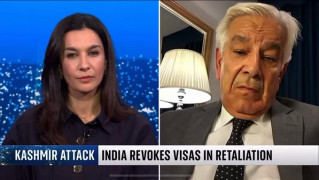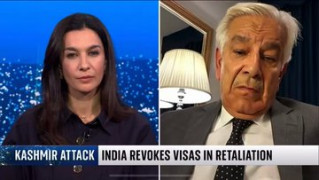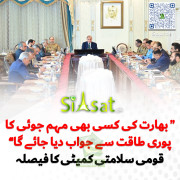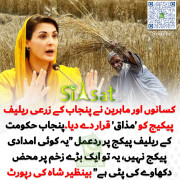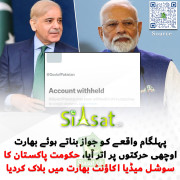Rashna
Banned
Rearranging the Subcontinent
By Robert D. Kaplan
The division of the Indian subcontinent between two major states, India and Pakistan (as well as a minor one, Bangladesh), may not be history’s last word in political geography there. For, as I have previously observed, history is a record of many different spatial arrangements between the Central Asian plateau andthe Burmese jungles.
For example, Pakistan can only be considered artificial if one is ignorant of the past in the region. Pakistan is merely the latest of various states and civilizations anchored either in the Indus River valley or in that of the Ganges. The chieftaincies of the late fourth to mid-second millennium B.C., comprising the Harappan civilization, stretched from Balochistan northeast up to Kashmir and southeast almost to Delhi and Mumbai — that is, greatly overlapping both present-day Pakistan and India.
From the fourth to the second century B.C., large areas of Afghanistan, Pakistan and India all fell under Mauryan rule. There was, too, the Kushan Empire, whose Indo-European rulers governed at times from what used to be Soviet Central Asia all the way to Bihar in northeastern India. And so it goes: For so much of history, there was simply no border between Afghanistan, Pakistan and the northern third of India — the heart of the Gangetic state.

And whereas the geography between Afghanistan and northern India was often politically united, the geography between today’s northern India and southern India was often divided. The point is, nothing we see on the current map should be taken for granted or, for that matter, is particularly anchored in history.
It was the British who actually created what in logistical terms is the subcontinent, uniting what is now India, Pakistan and Bangladesh in the late 19th century through a massive railway grid that stretched from the Afghan border in the northwest to the Palk Strait near Sri Lanka in the deep south, and from Karachi in Pakistan to Chittagong in Bangladesh.
(The Mughals and the Delhi sultanate also unified many of these areas, but through a looser system of control.) Because Afghanistan was ultimately unconquerable by British forces in the 19th century and also had a difficult terrain, it was left out of this modern railway civilization. But don’t assume that this particular British paradigm will last forever.
In fact, it has been crumbling for decades already. Pakistan’s de facto separation from Afghanistan began to end somewhat with the Soviet invasion of the latter country in December 1979, which ignited a refugee exodus down the Khyber and other passes that disrupted Pakistani politics and worked to further erode the frontier between the Pashtuns in southern and eastern Afghanistan and the Pashtuns in western Pakistan.
By serving as a rear base for the Afghan mujahideen fighting the Soviets during that decadelong war, which I covered first hand, the Soviet-Afghan war helped radicalize politics inside Pakistan itself. Johns Hopkins University Professor Jakub Grygiel observes that when states involve themselves for years on end in irregular, decentralized warfare, central control weakens. For a concentrated and conventional threat creates the need to match it with a central authority of its own.
But the opposite kind of threat can lead to the opposite kind of result. And because of the anarchy in Afghanistan in the 1990s following the Soviet departure and the continuation of fighting and chaos in the decade following 9/11, Pakistan has had to deal with irregular, decentralizing warfare across a very porous border for more than a third of a century now. Moreover, with American troops reducing their footprint in Afghanistan, the viability of Afghanistan could possibly weaken further, with a deleterious effect on Pakistan.
This raises the question of the viability of Pakistan itself and, by association, the continued existence of the current hard-and-fast borders of India, especially given that Bangladesh as well is, in relative terms, a weak and artificially conceived state in almost never-ending turmoil.
Pakistan is not necessarily artificial, of course. As Stratfor has written, Pakistan is the demographic and national embodiment of all the Muslim invasions that have passed down into India through much of history. It is artificial only to the extent that this vast Muslim demography, rather than configuring with a state, extends all the way from Anatolia to central India, and thus the specific borders of Pakistan only work to the extent that Pakistan is reasonably well governed, with responsive bureaucratic institutions, and possesses a civil society that reaches into the tribal hinterlands. But that is demonstrably not the case.
So Afghanistan truly matters, if not necessarily to American grand strategy than to the political destiny of Pakistan and thus to the Greater Indian subcontinent.
A post-American Afghanistan means a number of things. It means some further consolidation of Iranian influence in the western and central parts of the country and an extension of some Iranian influence in eastern Afghanistan as well.
This is because Pakistan will be frustrated in projecting even more influence into eastern and southern Afghanistan because of its own Taliban problem on its side of the border. In the 1990s, Pakistan could simply provide logistical and other means of support to the Afghan Taliban; now it is not so easy. At the same time, though, the Saudis will work through the Pakistanis to project whatever influence they can in Afghanistan. And Russia, through the Central Asian republics —
whose ethnic groups have compatriots inside northern Afghanistan — might exert more influence, too. India will work with both the Iranians and the Russians to exert its own influence as a limiting factor to that of the Pakistanis and the Saudis, even as the Pakistanis lately try to balance between the Iranians and the Saudis. Such competing outside influences and interferences may tend to work against central control from Kabul rather than in support of it. And an Afghanistan in partial chaos — let alone a complete state breakdown — may work over time to further destabilize Pakistan.
Of course, Pakistan would not suddenly collapse in this scenario. But it could decay in an exceedingly gradual way that its supporters and attendant area experts might at first be able to deny, even as the evolving mundane facts on the ground would be undeniable. The signs of decay are electricity outages, water shortages, a further deterioration of the urban environment, the inability to travel here and there in outlying areas because of security issues, the inability to get much done at a government office without a bribe or a fixer.
Pakistan has experienced such phenomena for decades already; the key will be the increase or decrease in their intensity. A state that cannot monopolize the use of forceand cannot supply adequate public services is weak. Pakistan we know is weak, despite the strengthening of its democracy and civil society in recent years. It already has ongoing insurgencies in the tribal areas, in Balochistan and in Karachi.
But will it become steadily weaker? Because prime ministers and presidents come and go, I am thinking beyond the high politics in Islamabad, New Delhi and Kabul and am more concerned with the granular, ground level reality in places such as Karachi or Quetta, or in the other parts of Sind and Balochistan.
What would a terminally diseased Pakistani state come to look like?
It might see more feisty regionalism in the southern provinces of Balochistan and Sind, whose leaders told me on a trip through the area some years ago that they would prefer over time a closer relationship with New Delhi than with Islamabad. These are people who never accepted a strong Pakistani state to begin with and always advocated more federalism.
With Balochistan and Sind moving closer to India, and the Afghanistan-Pakistan Pashtun border area in permanent disarray because of turmoil inside Afghanistan according to such a scenario, then a rump state of Greater Punjab might begin to emerge — again, denied for years by officials up until the point that it is undeniable.
India, of course, would not like any of this. Top officials of responsible states — which India certainly is — prefer the status quo and quiescent borders, not their opposite. But India might at some point in the 21st century have no choice but to confront Pakistan’s partial dissolution, and that would irrevocably change India.
Because geopolitics values not the ceremonial statements of leaders but the reality of control on the ground, the Indian subcontinent will continue to fascinate. It is important to note here Henry Kissinger’s view on India in his latest book, World Order: “India will be a fulcrum of twenty-first-century order: an indispensable element, based on its geography, resources, and tradition of sophisticated leadership, in the strategic and ideological evolution of the regions and the concepts of order at whose intersection it stands.
http://www.forbes.com/sites/stratfor/2014/12/24/rearranging-the-subcontinent/
By Robert D. Kaplan
The division of the Indian subcontinent between two major states, India and Pakistan (as well as a minor one, Bangladesh), may not be history’s last word in political geography there. For, as I have previously observed, history is a record of many different spatial arrangements between the Central Asian plateau andthe Burmese jungles.
For example, Pakistan can only be considered artificial if one is ignorant of the past in the region. Pakistan is merely the latest of various states and civilizations anchored either in the Indus River valley or in that of the Ganges. The chieftaincies of the late fourth to mid-second millennium B.C., comprising the Harappan civilization, stretched from Balochistan northeast up to Kashmir and southeast almost to Delhi and Mumbai — that is, greatly overlapping both present-day Pakistan and India.
From the fourth to the second century B.C., large areas of Afghanistan, Pakistan and India all fell under Mauryan rule. There was, too, the Kushan Empire, whose Indo-European rulers governed at times from what used to be Soviet Central Asia all the way to Bihar in northeastern India. And so it goes: For so much of history, there was simply no border between Afghanistan, Pakistan and the northern third of India — the heart of the Gangetic state.

And whereas the geography between Afghanistan and northern India was often politically united, the geography between today’s northern India and southern India was often divided. The point is, nothing we see on the current map should be taken for granted or, for that matter, is particularly anchored in history.
It was the British who actually created what in logistical terms is the subcontinent, uniting what is now India, Pakistan and Bangladesh in the late 19th century through a massive railway grid that stretched from the Afghan border in the northwest to the Palk Strait near Sri Lanka in the deep south, and from Karachi in Pakistan to Chittagong in Bangladesh.
(The Mughals and the Delhi sultanate also unified many of these areas, but through a looser system of control.) Because Afghanistan was ultimately unconquerable by British forces in the 19th century and also had a difficult terrain, it was left out of this modern railway civilization. But don’t assume that this particular British paradigm will last forever.
In fact, it has been crumbling for decades already. Pakistan’s de facto separation from Afghanistan began to end somewhat with the Soviet invasion of the latter country in December 1979, which ignited a refugee exodus down the Khyber and other passes that disrupted Pakistani politics and worked to further erode the frontier between the Pashtuns in southern and eastern Afghanistan and the Pashtuns in western Pakistan.
By serving as a rear base for the Afghan mujahideen fighting the Soviets during that decadelong war, which I covered first hand, the Soviet-Afghan war helped radicalize politics inside Pakistan itself. Johns Hopkins University Professor Jakub Grygiel observes that when states involve themselves for years on end in irregular, decentralized warfare, central control weakens. For a concentrated and conventional threat creates the need to match it with a central authority of its own.
But the opposite kind of threat can lead to the opposite kind of result. And because of the anarchy in Afghanistan in the 1990s following the Soviet departure and the continuation of fighting and chaos in the decade following 9/11, Pakistan has had to deal with irregular, decentralizing warfare across a very porous border for more than a third of a century now. Moreover, with American troops reducing their footprint in Afghanistan, the viability of Afghanistan could possibly weaken further, with a deleterious effect on Pakistan.
This raises the question of the viability of Pakistan itself and, by association, the continued existence of the current hard-and-fast borders of India, especially given that Bangladesh as well is, in relative terms, a weak and artificially conceived state in almost never-ending turmoil.
Pakistan is not necessarily artificial, of course. As Stratfor has written, Pakistan is the demographic and national embodiment of all the Muslim invasions that have passed down into India through much of history. It is artificial only to the extent that this vast Muslim demography, rather than configuring with a state, extends all the way from Anatolia to central India, and thus the specific borders of Pakistan only work to the extent that Pakistan is reasonably well governed, with responsive bureaucratic institutions, and possesses a civil society that reaches into the tribal hinterlands. But that is demonstrably not the case.
So Afghanistan truly matters, if not necessarily to American grand strategy than to the political destiny of Pakistan and thus to the Greater Indian subcontinent.
A post-American Afghanistan means a number of things. It means some further consolidation of Iranian influence in the western and central parts of the country and an extension of some Iranian influence in eastern Afghanistan as well.
This is because Pakistan will be frustrated in projecting even more influence into eastern and southern Afghanistan because of its own Taliban problem on its side of the border. In the 1990s, Pakistan could simply provide logistical and other means of support to the Afghan Taliban; now it is not so easy. At the same time, though, the Saudis will work through the Pakistanis to project whatever influence they can in Afghanistan. And Russia, through the Central Asian republics —
whose ethnic groups have compatriots inside northern Afghanistan — might exert more influence, too. India will work with both the Iranians and the Russians to exert its own influence as a limiting factor to that of the Pakistanis and the Saudis, even as the Pakistanis lately try to balance between the Iranians and the Saudis. Such competing outside influences and interferences may tend to work against central control from Kabul rather than in support of it. And an Afghanistan in partial chaos — let alone a complete state breakdown — may work over time to further destabilize Pakistan.
Of course, Pakistan would not suddenly collapse in this scenario. But it could decay in an exceedingly gradual way that its supporters and attendant area experts might at first be able to deny, even as the evolving mundane facts on the ground would be undeniable. The signs of decay are electricity outages, water shortages, a further deterioration of the urban environment, the inability to travel here and there in outlying areas because of security issues, the inability to get much done at a government office without a bribe or a fixer.
Pakistan has experienced such phenomena for decades already; the key will be the increase or decrease in their intensity. A state that cannot monopolize the use of forceand cannot supply adequate public services is weak. Pakistan we know is weak, despite the strengthening of its democracy and civil society in recent years. It already has ongoing insurgencies in the tribal areas, in Balochistan and in Karachi.
But will it become steadily weaker? Because prime ministers and presidents come and go, I am thinking beyond the high politics in Islamabad, New Delhi and Kabul and am more concerned with the granular, ground level reality in places such as Karachi or Quetta, or in the other parts of Sind and Balochistan.
What would a terminally diseased Pakistani state come to look like?
It might see more feisty regionalism in the southern provinces of Balochistan and Sind, whose leaders told me on a trip through the area some years ago that they would prefer over time a closer relationship with New Delhi than with Islamabad. These are people who never accepted a strong Pakistani state to begin with and always advocated more federalism.
With Balochistan and Sind moving closer to India, and the Afghanistan-Pakistan Pashtun border area in permanent disarray because of turmoil inside Afghanistan according to such a scenario, then a rump state of Greater Punjab might begin to emerge — again, denied for years by officials up until the point that it is undeniable.
India, of course, would not like any of this. Top officials of responsible states — which India certainly is — prefer the status quo and quiescent borders, not their opposite. But India might at some point in the 21st century have no choice but to confront Pakistan’s partial dissolution, and that would irrevocably change India.
Because geopolitics values not the ceremonial statements of leaders but the reality of control on the ground, the Indian subcontinent will continue to fascinate. It is important to note here Henry Kissinger’s view on India in his latest book, World Order: “India will be a fulcrum of twenty-first-century order: an indispensable element, based on its geography, resources, and tradition of sophisticated leadership, in the strategic and ideological evolution of the regions and the concepts of order at whose intersection it stands.
http://www.forbes.com/sites/stratfor/2014/12/24/rearranging-the-subcontinent/
Last edited by a moderator:



